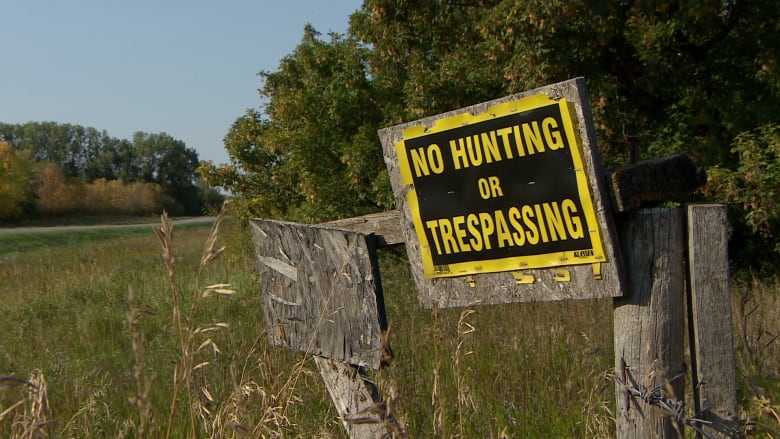Majority surveyed in Sask. want consent mandatory to go on rural land: government
65 per cent of responses want visitors to get advance consent

The Saskatchewan government says its survey on trespassing laws shows a majority want to see visitors be required to get consent from a landowner prior to entering their property.
The results of the survey, which ran from Aug. 9 to Oct. 2, were released Thursday.
It asked four questions, including "Should all access by members of the public to rural property require the express advance permission of the rural land owner regardless of the activity?"
Currently the onus is on land owners to post signs indicating they do not want people to enter their property. Justice Minister Don Morgan said the survey indicates people are in favouring of reversing that onus, placing it on the visitor to get prior consent.
Changes are expected to be introduced later this fall.
Justice Minister Don Morgan wouldn't say whether those changes would put a reverse onus on the public, only that the update will "clarify the consent requirements for those seeking access to privately-owned land for recreational activities like hunting and snowmobiling."
"We'll have to look at what the consultation is. We probably will have some groups that we want to meet, but ... that's certainly the direction that we heard from the survey," Morgan said, adding the government wants to meet with hunters' group.
Morgan said getting consent from landowners is already required for hunters and the changes could would bring Saskatchewan in line with other provinces.

Province says 1,601 responses to survey
The province says 1,601 responses were received in total, with 1,039 in favour of people having to get advance consent before entering someone's land regardless of their reason for entering, 515 opposed and 47 inconclusive.
"Most respondents said that the existing onus on rural land owners to post their land in a particular manner in order to prevent trespassing was frustrating and unfair, and that the burden should lie on the person seeking access to request permission," the province said in a statement Thursday.
In the survey, the province also asked "How should permission be sought and granted?"
"There was less clarity in the responses around how such permission should best be sought and granted. Some responses advocated advance written permission, while others supported the practice of providing oral consent, or consent through posting or other signage," according to the province.
Looking for landowner? Check land titles office, says minister
Asked about the potential difficulty of getting hold of a rural land owner to seek prior consent, Morgan said: "We'd urge people to sort of reach out, contact neighbours or work through the RM."
"The RM and the land titles office provides you with a name of the registered owner, the address might not be up to date, but usually you find who it is."
Morgan added it could be further complicated by the fact the registered owner of a property may not be the person who controls the land.
SARM in support, FSIN concerns about vigilantism
The Saskatchewan Association of Rural Municipalities (SARM) penned a letter to the Ministry of Justice in September, saying its member support the public needing prior consent to enter rural land, citing that RMs had brought forward resolutions in regards to trespassing laws.
SARM also told the province that trespassing fines needs to be steeper.
"I don't think people should assume that this is going to cure rural crime," said Morgan.
According to the province, people expressed concerns about hunter safety, rural crime and biosecurity when it came to trespassing.
Meanwhile others have expressed concerns. Heather Bear, vice-chief of the Federation of Sovereign Indigenous Nations previously said by strengthening trespassing laws, it could promote vigilantism.
Morgan said he would like to talk to some of the First Nations leaders, saying he is trying to meet with FSIN Chief Bobby Cameron.
He said government does not want to diminish treaty rights and said this move is not a step toward stand your ground legislation or castle laws.

Government needs to do broader consultations, says NDP
Sask. NDP justice critics Nicole Sarauer said the government needs to do broader consultations on the proposed changes.
She cited hunters' concerns about the potential impacts and questioned whether revamped trespassing laws will help combat rural crime.
"If their concern is really rural crime they would have moved as quickly on a crystal meth strategy as they did on this legislation," said Sarauer.
The government has released the responses the survey garnered. Read them here:
(PDF KB)
(Text KB)CBC is not responsible for 3rd party content

